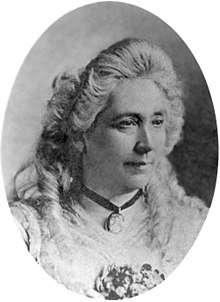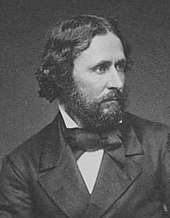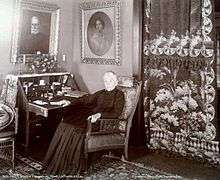Jessie Benton Frémont
Jessie Ann Benton Frémont (May 31, 1824 – December 27, 1902) was an American writer and political activist.
Jessie Benton Frémont | |
|---|---|
 Photo taken in 1876 | |
| Born | Jessie Ann Benton May 31, 1824 |
| Died | December 27, 1902 (aged 78) Los Angeles, California |
| Spouse(s) | John C. Frémont |
| Signature | |
Frémont's initial notability came from her family: she was the daughter of Missouri Senator Thomas Hart Benton and the wife of military officer, explorer and politician, John C. Frémont. She wrote many stories that were printed in popular magazines of the time as well as several books of historical value. Her writings, which helped support her family during times of financial difficulty, were memoirs of her husband's, and her own, time in the American West—back when the West was an exotic frontier.
A great supporter of her husband, who was one of the first two Senators of the new U.S. state of California and a Governor of the Territory of Arizona, she was outspoken on political issues and a determined opponent of slavery, which was excluded from the formation of California. By maintaining a high level of political involvement during a period that was extremely unfavorable for women, Jessie Benton Frémont proved herself to be years ahead of her time.
Early life
She was born near Lexington, Virginia, the second child of Thomas Hart Benton (1782–1858) and Elizabeth McDowell (1794–1854). She was born in the home of her mother's father, James McDowell. Her father, Senator Benton,[1] had been wanting a son, but went ahead and named her in honor of his father, Jesse Benton.
Jessie was raised in Washington, D.C., more in the manner of a 19th century son than daughter, with her father, who was renowned as the "Great Expansionist," seeing to her early education and introducing her to the leading politicians of the day, an unusual thing for the period.[2] Jessie was very close to her father and stuck by his side. He shared with her the many books and maps in the valise that always accompanied him on their trips to and from Missouri and Virginia. She began, too, to share his dream of a nation stretching from ocean to ocean. In this manner, she became well educated in the ways of social structure and the disciplines of politics, history, literature and languages. After attaining some fluency in French and Spanish, Jessie helped in the translation of government documents.
In 1840 at age 16, while studying and living at Georgetown Seminary, she met Lieutenant John C. Frémont who was in Washington preparing a report on explorations (with Joseph Nicollet as commander) he had made between the Missouri River and the northern frontier of the United States. They became engaged, but her parents objected to a marriage at that time because of her age. Probably through the influence of Col. Benton, Frémont then received an order from the war department to make an examination of the Des Moines River on the western frontier. Shortly after their return they were married on October 19, 1841.[3]
American West
For a while after their marriage, Jessie and her husband lived on Army posts, until Frémont was assigned the task of exploring the West and scouting land for future U.S. territorial expansion. It was this assignment that began the couple's rise to fame.

A reconciliation occurred between Jessie and her father when he promoted Frémont's famous explorations of the West.[1] Senator Benton had been persuaded by his ailing wife to accept the marriage, and the couple moved into the Benton home. Frémont left his pregnant wife behind in the spring of 1842 to lead his first expedition to mark the trails West. He returned, however, days before the birth of their eldest child, Elizabeth Benton "Lily" Frémont, who was born November 15, 1842, in Washington D.C. He then headed off again and Jessie and the baby remained behind.
Frémont became known as the "Pathfinder to the West", after James Fenimore Cooper's novel, the Pathfinder[1] Jessie, intensely interested in the details of his expedition, became his recorder, making notes as he described his experiences. Adding human-interest touches to these printed reports, she wrote and edited best-selling stories of the adventures Frémont had while exploring the West[1] with his scout, Kit Carson. Thus, she involved herself in her most happy life's work, interpreting her husband and his actions for a public eager for information about the opening of the West. Written during a time when the concept of Manifest Destiny was becoming increasingly popular, these narratives were received with great enthusiasm.[1]
Her husband was involved tangentially in the conquest of California, the annexation of which occurred as a result of the Mexican-American War. He served as the 3rd Military Governor, in 1847. At the time of the court-martial of Frémont, during which he attempted to defend his actions in the Bear Flag Revolt, Jessie gave birth to a son, Benton Frémont, on July 24, 1848, in Washington, D.C. The baby's death, within the year in St. Louis, she blamed on her husband's accuser, General Kearny.
In 1849, Jessie and Lily made a harrowing and treacherous journey aboard ship to join Frémont in California. After disembarking and crossing the Isthmus of Panama, they boarded another vessel to San Francisco. With income from their gold mines, the Frémonts established a home and settled into San Francisco society. As a politically informed woman, Jessie was known to get involved in city politics and discuss with the men any issues that were of importance at the time.
Political life
John C. Frémont served from September 9, 1850, to March 3, 1851, as a Senator from California. Their third child, John C. Frémont Jr., was born on April 19, 1851, at Las Mariposas, California. While the couple was visiting Paris, France, their fourth child, Anne Beverly Frémont, was born on February 1, 1853. Anne died five months later, on July 11, in Washington, D.C. Their fifth and final child, Francis Preston Frémont, was born on May 17, 1855, in Washington.
In 1856, Frémont's antislavery position was instrumental in his being chosen as the first-ever Republican candidate for President.[1] Jessie played an extremely active role in the campaign, rallying support for her husband. One particular campaign slogan read, "Frémont and Jessie too." Her father, however, a lifelong Democrat, refused to endorse her husband's bid for the presidency. This did not stop the supporters of Frémont from continuing to refer to her as the "first lady in the land," a title her admirers continued to use throughout her life.[4]
Frémont garnered many Northern votes, but ultimately lost the election to James Buchanan, though he did surpass the American Party candidate, Millard Fillmore. Frémont was unable to carry the state of California. If he had taken the state of Pennsylvania he would have won.
In the years following, the couple moved several times, living in California, St. Louis, and New York. She played an active role in the anti-Secession movement in California in 1861[5] and enlisted both Unitarian minister Thomas Starr King and writer Bret Harte to her crusade.[1] When Lincoln appointed Frémont as the Commander of the Department of the West in 1861, they returned to St. Louis.
Jessie Frémont served as her husband's unofficial aide and closest adviser. The two shared the belief that St. Louis was unprepared for war and needed reinforcements and supplies, and both pressured Washington to send more supplies and troops. She threw herself into the war effort, helping to organize a Soldier's Relief Society in St. Louis, and becoming very active in the Western Sanitary Commission, which provided medicine and nursing to soldiers injured in the war.
One of the most impressive feats of her political career came shortly after Frémont lost his position during the Civil War for issuing his own edict of emancipation, summarily freeing all of the slaves in Missouri, which antedated Lincoln's own Emancipation Proclamation. Jessie actually traveled to Washington and pleaded with Lincoln on behalf of her husband, but to no avail.[6]
Later years

The Frémonts would not live in St. Louis again, moving to New York and then California. In the Panic of 1873, John C. Frémont, who had invested heavily in railroad stock, lost everything and declared bankruptcy. Undaunted by their financial situation, Jessie began writing books to help support the family, namely A Year of American Travel: Narrative of Personal Experience (1878), a story about her journey to California in 1849, and Souvenirs of My Time (1887).
From 1878 to 1881, John C. Frémont served as Governor of the Territory of Arizona. Three months after being allowed to resign from the Army with pension, he died in 1890 in a hotel in New York.
After the death of her husband, the Congress, in recognition of his valued services, granted Jessie a widow's pension of $2,000 a year. In 1891, she moved into a home at the corner of 28th and Hoover Streets in Los Angeles, that was presented to her by a committee of ladies of the city as a token of their great regard.[7][8] She remained in good health until about two and a half years before her death when an accident made her an invalid, but she was able to use a wheelchair and enjoy the outdoors.
Jessie Benton Frémont died at age 78 at her home in Los Angeles.[9][10] A huge box of fragrant and beautiful roses was sent on December 29, 1902, by Mrs. James A. Garfield. The rites of the Episcopal Church were conducted at 10:30 a.m. on December 30, at Christ Church, on the corner of Pico and Flower Streets.[11] She was cremated and her ashes interred in Rosedale Cemetery.
In 1960, actress Lorna Thayer was cast as Jessie Frémont in the episode, "The Gentle Sword" of the syndicated television anthology series, Death Valley Days. In the story line, the Frémonts, in California during the gold rush, become involved in a mining claim dispute; Mrs. Frémont stares down organized claim jumpers.[12]
Works
- The Story of the Guard: A Chronicle of the War (1863)
- A Year of American Travel: Narrative of Personal Experience (1878)
- Souvenirs of My Time (1887)
- Far-West Sketches (1890)
- The Will and the Way Stories (1891)
- The Origin of the Frémont Explorations (1891)
- The book Memoirs of My Life (1887) by John C. Frémont includes Sketch of Senator Benton by Jessie Benton Frémont.
Letters
- The letters of Jessie Benton Frémont (1993) edited by Pamela Herr and Mary Lee Spence, Urbana: University of Illinois Press.
- Collection of 271 letters offering insights into the mind and heart of the author, across the span of her life, including her husband's presidential campaign, her role in the Civil War, her time as First Lady of the Territory of Arizona, and her impressions of the late 1800s in California.
Biographies
- Jessie Fremont at Black Point (1974) by Lois Rather, Rather Press, Oakland CA
- Jessie Benton Frémont: A Biography (1987) by Pamela Herr
- Jessie Benton Frémont: A Woman who Made History (1995) by Catherine Coffin Phillips
- Jessie Benton Frémont: Missouri's Trailblazer (2005) by Ilene Stone and Suzanna M. Grenz
- Passion and Principle: John and Jessie Frémont, the Couple Whose Power, Politics, and Love Shaped Nineteenth-century America (2007) by Sally Denton
- Imperfect Union: How Jessie and John Fremont Mapped the West, Invented Celebrity and Helped Cause the Civil War, (2020) by Steve Inskeep, Penguin Press
In fiction
- Immortal Wife: The Biographical Novel of Jessie Benton Frémont (1944) by Irving Stone
- Phillips, Michael and Judith Pella. The Journals of Corrie Belle Hollister: On the Trail of the Truth Bethany House Pub., 1991.
- Dream West is a 1982 historical novel by David Nevin about Charles and Jessie Frémont, which was adapted into a 1986 miniseries of the same name.[13]
References
- Tarnoff, Ben (2014). The Bohemians: Mark Twain and the San Francisco Writers Who Reinvented American Literature. Penguin Books. pp. 29–30. ISBN 9781594204739.
- "Jessie Benton Frémont: Missouri's Trailblazer". UMsystem.edu. Archived from the original on June 13, 2010. Retrieved April 13, 2008.
- Wilson, J. G.; Fiske, J., eds. (1900). . Appletons' Cyclopædia of American Biography. New York: D. Appleton.
- "The Late Jessie Benton Frémont". Chronicle and Comment. The Bookman: 535. February 1903. Retrieved June 1, 2019.
- Whitewashing Civil War History Archived February 9, 2012, at the Wayback Machine Hollis Robbins
- Corbett, Katharine T. (1999). In her place: a guide to St. Louis women's history. Missouri History Museum. p. 84. ISBN 978-1-883982-30-0.
- New York Times, July 26, 1891, from the Los Angeles Express, July 14, "Mrs. Frémont's New Home --- She Occupies The House Given To Her By California Ladies," p. 15
- Los Angeles Times, August 15, 1897, "Mrs. Jessie Benton Frémont --- An Historic Figure Now Living Among the Roses of Los Angeles," p. 16
- Los Angeles Times, December 28, 1902, "Pathfinder's Widow Crosses The Divide --- Death Last Evening of Mrs. Jessie Benton Frémont, the Most Famous Woman in Los Angeles—Story of Romantic and Helpful Life," p. 7
- New York Times, December 29, 1902, from Los Angeles, Dec 28, "Gen. Frémont's Widow Dead --- Had Been an Invalid for Two and a Half Years—Eloped with Lieut. Frémont at the Age of Fifteen [sic]," p. 7
- Los Angeles Times, December 30, 1902, "Thrilling Episodes in the Career of Mrs. Fremont --- A Woman's Influence," p. A 1
- "The Gentle Sword on Death Valley Days". Internet Movie Data Base. Retrieved October 5, 2018.
- The New York Times: David Nevin, Author of Historical Novels, Dies at 83.
External links
- 1839 Portrait of Jessie Benton Frémont
- The Frémonts and Emancipation in Missouri
- Works by or about Jessie Benton Frémont at Internet Archive
- Works by Jessie Benton Frémont at LibriVox (public domain audiobooks)

- Jessie Benton Frémont at Find a Grave
- Territorial Women's Memorial Rose Garden: Jessie Ann Benton Fremont
- Territorial Women's Memorial Rose Garden: Elizabeth Benton (Lily) Fremont